- Home
- J. T. Edson
Cap Fog 6 Page 2
Cap Fog 6 Read online
Page 2
‘And a damned good piece of work it was,’ Houghton-Rand praised. ‘But I can’t understand why a band of—well, let’s not mince words and call them what they are, no matter how rich—art thieves, who must all be getting on well in years, should want to have Sir Randolph and I followed.’
‘Although some of the original group are still active, others have been replaced by younger—albeit equally wealthy—men,’ the detective explained. ‘What is more, from the beginning, desirable though they undoubtedly considered the—um—end result to be, the acquisition of such objet d’art was in all too many cases subsidiary to some more sinister business.’
‘In what way?’ the Home Secretary asked.
‘Any way which would show them a substantial—um—profit,’ Mr. Reeder replied and elaborated.
One early example was the support the Attainers gave to Phillipe Jose Urrea when he took over as Presidente of Santa Carlos. In return for this, companies which they controlled—although none of their names were listed on the Board of Directors—were granted various concessions in that country which more than recompensed them for the costs they incurred. As a bonus, one of them was allowed to substitute an exact duplicate for the famous Cross Of Santa Carlos from the capital’s cathedral. Since then, they had continued to sponsor minor insurrections, or ferment revolutions, wherever it would be to their benefit. However, while Mr. Reeder admitted no legal proof against the Attainers had been obtained, he and his associates knew one of their efforts had not been minor in its effects. They had arranged for the assassination of Archduke Francis Ferdinand and Duchess Sophie of Austria at Sarajevo on 28 June 1914. This put the whole world in arms and, as they were prepared for the War which followed, increased their fortunes immensely.
Despite the evidence being insufficient to allow anybody to be brought to trial, Mr. Reeder claimed that the Attainers had had a great many Russian art and other treasures—including the Lafcadio Loan Collection reported as destroyed in Moscow during 1918, but actually now in the possession of those Attainers who specialized in collecting paintings 5 —given to them as part of the recompense for the services they rendered to the revolutionaries in that country. They had not acted from any political ideals, their motivation being profit and the protection their own interests received against Bolshevik atrocities or interference. More had been forthcoming as a result of their being the greatest of assistance to the Russian Government, who as yet did not have outlets of their own, in supplying arms and explosives to anarchists and radicals elsewhere in the world.
‘Most of what you’ve told me is pure conjecture,’ the Home Secretary commented, as Mr. Reeder stopped speaking. ‘And, even when you are sure of something, you admit there isn’t enough evidence to make it stand up in court.’
‘Unfortunately, sir, that has been the—um—case—up to now,’ the detective conceded.
‘Then you have evidence at last?’ Houghton-Rand asked hopefully.
‘Not yet, sir,’ Mr. Reeder admitted, once again speaking with conviction. ‘However, I might not be over-stating the—um—issue if I was to say we have the chance of a—um—lifetime to gravely curtail their future activities and perhaps even bring their reign of crime to an end.’
‘And I agree, Farmer,’ Sir Randolph declared.
‘Tell me more,’ Houghton-Rand requested, sitting up straighter.
‘We have had communication with the man who might be considered the “Managing Director” of their “branch” in the United Kingdom,’ the detective obliged and, somehow, he seemed to be much younger than was suggested by his archaic attire and general appearance. What was more, the hesitancy left his speech. ‘He’s sent us sufficient proof to establish his claim to that position and offers to give us evidence which will let us achieve our purpose. In return, he asks for immunity and that no attempt will be made to trace him after he has carried out his part of the bargain.’
‘With so little time to make the arrangement, I took it upon myself to agree,’ the Director of Public Prosecutions asserted.
‘You did the right thing,’ Houghton-Rand replied, nodding approval. ‘Now what is going to happen?’
‘We have been given a rendezvous, a password and countersign by which the informant and our collector of the information may recognize each other,’ Mr. Reeder explained, as once more his superior made it plain he was to continue. ‘He will give us the means by which we can obtain all the documentary proof we require and, in return, we have agreed to take no action, other than checking it is all he claims, for two days. I feel nothing would have been gained by denying this period of grace as it will, in all probability, take us longer than that to check everything he has to offer.’
‘Then everything is straightforward enough,’ the Home Secretary suggested, wondering why he had been brought into the matter at this particular stage of its development.
‘So far,’ Mr. Reeder agreed and reverted to his previous style of seemingly hesitant speech. ‘Nevertheless, the affair is still a long way from being over and I admit I am—um—uneasy. For the past two days, we have all been kept under observation and we are at a loss to know why. Certainly it is not being done by any—um—criminals with whom we have had dealings, or who may expect us to do so in the not too distant future. In fact, every one we have questioned denies all knowledge of it.’
‘And you think the Attainers may have learned what their man intends?’ Houghton-Rand asked.
‘He was still alive this morning, which makes me believe nothing—um—certain about his intentions is known,’ the detective replied. ‘However, my—um—criminal mind suggests it may be suspected that he is dissatisfied with his lot for some reason and seeks to sever his connections with them. In which case, even though he probably has accrued sufficient of their—um—money to make him financially independent of them, he would know he will never be safe while they are in their present position of power. Having drawn such a conclusion, they would probably consider he would approach me—if you will forgive the—um—immodesty of the assumption—as the one most suitable to help him attain his ends.’
‘And that’s why you thought we might be followed here?’
‘It is. They would know I would need someone with greater authority to give final concurrence to the arrangement.’
‘You have it,’ Houghton-Rand stated. ‘Can I ask where the rendezvous is?’
‘Certainly, Sir Howard,’ Mr. Reeder assented.
‘Good God, man!’ the Home Secretary gasped, on being told the location of the meeting. ‘It can’t be there. He wouldn’t allow it!’
‘Nevertheless, that is where the—um—rendezvous is to take place,’ the detective claimed with absolute conviction. However, he refrained from mentioning a theory which his ‘criminal mind’—the more dramatic designation he gave to his penchant for producing theories which seemed too fantastic to be true, yet frequently proved correct—had suggested. ‘I am so—um—sure of this, I have already made preparations for the—um—collection.’
‘But from what you’ve said so far, I assume you won’t be collecting whatever it is this chap, whoever he is, has to offer personally.’
‘Regrettably, I will not. Nor, as I feel sure they are all marked, will any other member of our organization.’ ‘Then who—?’
‘A young man of great courage and considerable initiative; but who, we hope for his sake, is not known to have any—um—connection with us. He is fully cognizant with the risks, also that we have done as much as we can to try to minimize them. However, Sir Howard, should things go—um—amiss, we will need your assistance.’
‘In what?’ Houghton-Rand asked.
‘Providing adequate support to ensure his safe departure from the rendezvous,’ Mr. Reeder answered and his face became grave. ‘We are up against men of a ruthlessness far beyond any criminal in the United Kingdom and who will not hesitate before resorting to the use of firearms should the need arise.’
‘And you want authority to have the local police armed,’ the Home Secretary guessed.
‘That would be a sensible—um—precaution, Sir Howard,’ the detective conceded. ‘However, I would also suggest you have troops standing by. What is more, I consider you would be—um—wise, to select those who have most recently returned from India, or some other area in the Empire, where they have had experience of being under—um—hostile fire.’
‘You think it could be that serious,’ Houghton-Rand said somberly.
‘I know it could,’ Mr. Reeder corrected grimly. ‘In fact, sir, with that contingency in mind, I fear we must ask for your—um—official assistance in another matter.’
One – Rapido
‘Well I’ve got us here without having a collision, running over somebody, or even so much as putting us into a ditch, much to your surprise,’ said a cheerful young feminine voice, from outside the main dining-room of the Admiral Cornwallis Inn. The voice was of a kind which one might expect to hear at such an elegant establishment in Hampshire. The tones were indicative of good breeding and upbringing, but showed amusement rather than resentment over what had obviously been criticism of her ability as a driver. ‘Now what do you think of this place, Rap … Edward?’
‘I’d say it’s mighty fine, way it looks, and going by the smell of cooking I’m getting,’ came a masculine reply with a drawling and vastly different accent. ‘I’ll tell you, Beryl, you’ve got us beat to all get out over here when it comes to fancy saloons. We don’t have anything like this back home to Texas, nor any other place I’ve been in the good old US of A.’
Listening to the second comment as he sat in a booth, Doctor Andrew Lachlan McCallister, MD, concluded that the still unseen second speaker’s origins were on the other side of the Atlantic Ocean. However, the voice did not ha
ve the somewhat nasal twang generally associated with people from the United States due to it being most frequently parodied on the stage in England. Having spent three months in the United States shortly after becoming qualified, even without hearing the reference to ‘back home to Texas’, McCallister would have known enough to conclude the still unseen man had been born and raised somewhere south of the ‘Mason-Dixon’ line.
Considering the implications suggested by the two voices, McCallister darted a worried glance at the only other three occupants of the large and comfortably furnished dining-room. Unkempt in dress, all were tall, two being lanky and the other built on massive lines. It was obvious from their appearance and what they had been saying that they were all in a very bad humor and he suspected that they would not be averse to finding somebody upon whom they could vent their spleen.
The doctor did not recognize any of the trio, but could guess what they were. Since settling in London, he had come across a number of people looking, speaking and behaving as they did among the pseudo-intellectual set which based itself, dabbling in what they called ‘art’ and espousing politics of a communistic persuasion, in and around the Bloomsbury district. Although he had been surprised to see them so far from their usual haunts, the remarks passed between them had supplied a reason. He was aware that their kind, despite professing a hatred of capitalism and those who benefited from it, never hesitated to batten on to anybody who was wealthy—and stupid—enough to keep them in better circumstances than were usually their lot.
It seemed the trio had been fortunate enough to find such a person. A middle-aged spinster had developed a taste for what she believed to be the Bohemian style of life and had invited a group of their kind to stay in the grounds of a nearby mansion where she lived as a permanent house-guest of her wealthy family. Far from being grateful, they had encouraged her to demean herself by acting in ways most unsuitable for one of her years. This behavior had come to a head that morning. Having been induced to dance in a diaphanous gown most unsuitable for a woman of her years and less than slender build, she had suffered a stroke. Apparently, what they had not realized was that, in the interests of keeping the peace with their hostess—who had a penchant for hysterics, or highly dramatic, ear-splitting and prolonged vocal protests, which made everybody else’s life a misery, when her desires were thwarted—the family had allowed them to remain on sufferance. Using the incident as an excuse, the owner had ordered the entire party to leave the property. The rest had gone straight back to London, but they had elected to break their journey at the Inn.
Despite finding the frequent and gratuitous profanities with which the trio interspersed their conversation annoying, being afraid of the possible consequences to himself was not the reason McCallister had refrained from stating his objections. Nor did he doubt he could hold his own if they started to take out their spite on him. While not as tall as any of them, he had a sturdy build and, living an active life outside his profession, was much fitter. Therefore, he did not doubt his ability to render a good account of himself if there should be a rough-and-tumble. But having been imbued since childhood with a respect for law and order, he had also developed a strong sense of responsibility to his profession since graduating as a doctor and all this prevented him from following his inclination.
Neatly dressed in a tweed three-piece suit, with a white shirt and his old school tie, there was an air of mildness about McCallister’s pleasantly good looking, clean shaven face which was far from being his true nature. At school and while a medical student, he had established a reputation for being willing to indulge in any kind of rough horseplay or any reckless escapade his fellows thought up. On qualifying three years ago and being accepted as assistant to his uncle, Sir James Bannister, MD—plus numerous other initials—he had elected to live in a more sedate fashion as required by his changed circumstances. Nevertheless, the old spirit still remained and showed itself on such occasions as Burns’ Night, or Hogmanay, which Scots living outside their native land tended to celebrate with even greater gusto than when at home. However, it was neither of these days and he was willing to remain in the background as long as the truculent trio continued to ignore him.
Until the arrival of the trio, whose names appeared to be Giles, Ben and Leonard, McCallister had been as relaxed and at ease as was possible under the circumstances. It was the last Friday in June, the weather was pleasantly warm rather than oppressively hot and he had been deriving satisfaction from the thought that he was going to be far removed from his routine professional duties until the following Tuesday. Realizing that he was making better time on the journey than he had anticipated and having no desire to arrive at his destination too early, despite the interest he had in the weekend house party he had been invited to attend at Mansfield Manor, he had decided to stop and have lunch at the Admiral Cornwallis Inn. He had just been finishing his meal when the untidy trio put in their appearance.
On coming in, the three had remained at the bar instead of taking seats at a table. Looking somewhat grudging, McCallister had concluded, Giles, the tallest, had bought drinks for them and, showing even more reluctance, supplied cigarettes from a tarnished silver case. Studying the slender brown tubes, the doctor felt sure he had come across a similar type in the course of his specialized professional duties. He had also noticed that, having served them with drinks and cast a glance in his direction which took in his still half-finished pint of beer, the elderly combined barman and waiter had withdrawn from the room and had not returned.
In an attempt to put the three from his mind, McCallister has set about dealing with the second reason he had had for breaking his journey. He had been beyond the suburbs of London before remembering he had not passed on certain instructions to another of his uncle’s assistants. Nor, to his relief, had he seen a telephone box from which he might rectify the situation. Removing one of the already stamped blank postcards which he invariably carried in his wallet, he had laid it before him on the table. However, on taking the fountain pen from the left breast pocket of his jacket, a low hiss of annoyance had broken from his lips. It was not his own, but one he had bought from the Magic Supplies’ counter at Selfridges as a birthday present for a nephew. While it looked normal, he had known there was no point in writing the message with it.
Returning the pen to the pocket from which it had come and deciding he would borrow one from the Inn, having no desire to contact his colleague by telephone as this was sure to entail an unnecessary, long and tedious discussion which he wanted to avoid, McCallister found his dislike for the behavior of the trio increasing. He also conceded the situation could have been worse. There was nobody else present who might have taken umbrage at their loudly spoken remarks and, if they had arrived earlier, their foul language would have spoiled his enjoyment of an excellent meal of the kind for which the Admiral Cornwallis Inn was famous.
Now that situation seemed likely to change!
Noticing the three men by the bar were looking towards the doorway, McCallister turned his gaze in the same direction and studied the couple who entered. In view of his assumptions regarding the unkempt trio, particularly where the masculine newcomer was concerned, he was disappointed by what he saw. Unless he was mistaken, by virtue of her obvious ‘county’ background and the nationality of her companion, both would be regarded as suitable should the other occupants of the room wish to take out their spite upon somebody.
If it had not been for his misgivings where the trio were concerned, McCallister would have found the female newcomer a most pleasing sight. In fact, as he did not share their prejudices against members of the upper class, she was the kind of woman he regarded as being most attractive. Not quite five feet four inches in height, she looked to be in her early twenties at most. Even being clad in a thick white woolen polo-neck pullover, jodhpurs and suede chukka boots could not conceal the shapely contours of a body fast ripening into womanhood. Partially concealed by a rakishly tilted black beret, her boyishly short and shingled platinum blonde hair framed a radiantly beautiful golden tanned face which showed breeding, strength of will and intelligence in its lines. Despite her youth and small size, there was about her the indefinable aura of one long accustomed to making decisions and having them carried out. She moved with a free-stepping and straight backed grace which neither sought to emphasize, nor distract from, her femininity and everything about her suggested she indulged in a healthy outdoors existence.

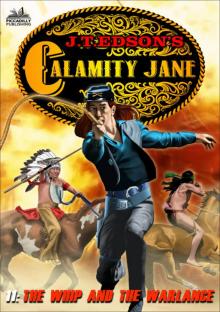 Calamity Jane 11
Calamity Jane 11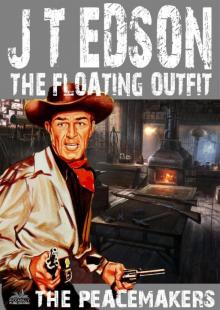 The Floating Outift 33
The Floating Outift 33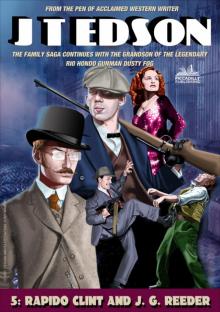 Cap Fog 5
Cap Fog 5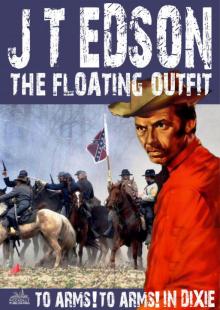 The Floating Outfit 34
The Floating Outfit 34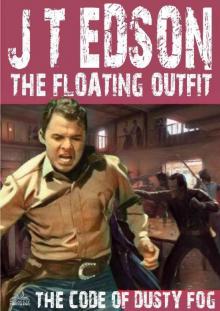 The Code of Dusty Fog
The Code of Dusty Fog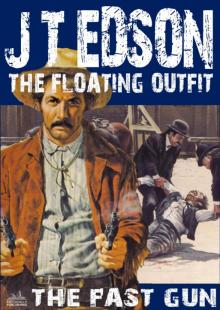 The Floating Outfit 21
The Floating Outfit 21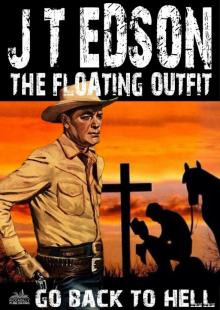 The Floating Outift 36
The Floating Outift 36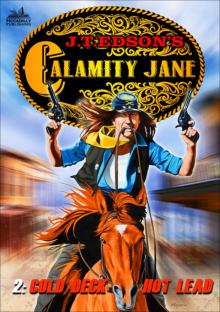 Calamity Jane 2
Calamity Jane 2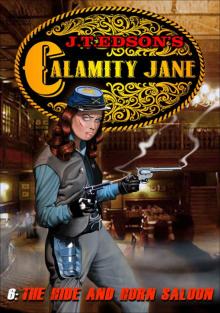 Calamity Jane 6: The Hide and Horn Saloon (A Calamity Jane Western)
Calamity Jane 6: The Hide and Horn Saloon (A Calamity Jane Western) Waco 7
Waco 7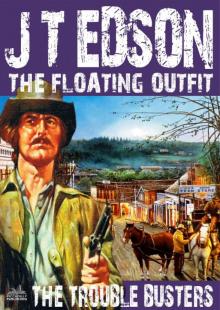 The Floating Outfit 25
The Floating Outfit 25 Waco 7: Hound Dog Man (A Waco Western)
Waco 7: Hound Dog Man (A Waco Western)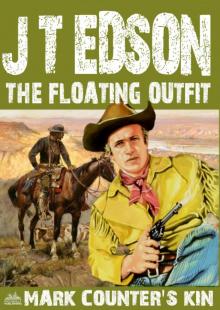 The Floating Outfit 47
The Floating Outfit 47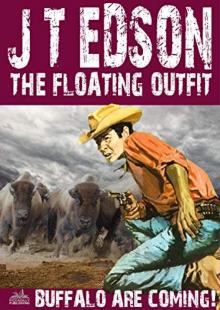 The Floating Outfit 42: Buffalo Are Coming!
The Floating Outfit 42: Buffalo Are Coming!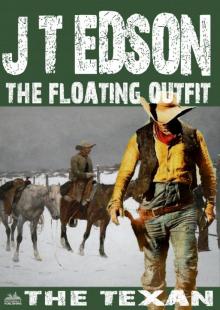 The Floating Outfit 46
The Floating Outfit 46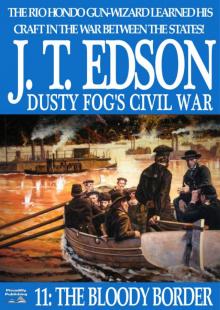 Dusty Fog's Civil War 11
Dusty Fog's Civil War 11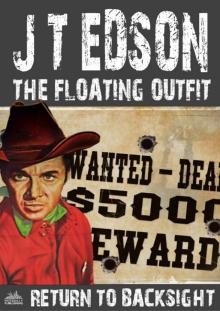 The Floating Outfit 61
The Floating Outfit 61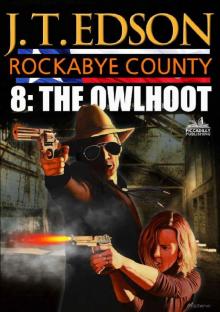 The Owlhoot
The Owlhoot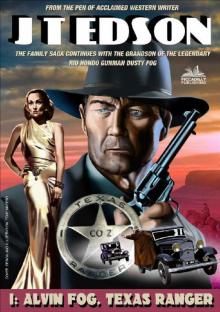 Alvin Fog, Texas Ranger
Alvin Fog, Texas Ranger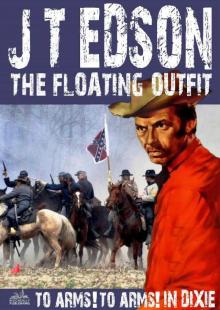 The Floating Outfit 34: To Arms! To Arms! In Dixie! (A Floating Outfit Western)
The Floating Outfit 34: To Arms! To Arms! In Dixie! (A Floating Outfit Western)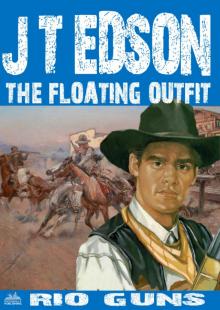 The Floating Outfit 44
The Floating Outfit 44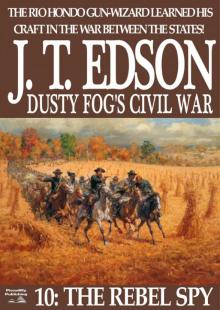 Dusty Fog's Civil War 10
Dusty Fog's Civil War 10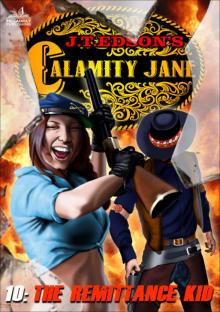 Calamity Jane 10
Calamity Jane 10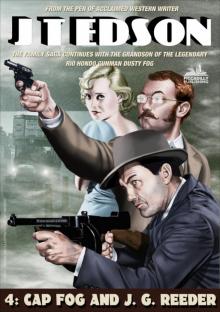 Cap Fog 4
Cap Fog 4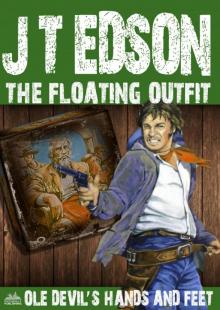 The Floating Outfit 51
The Floating Outfit 51 The Floating Outfit 50
The Floating Outfit 50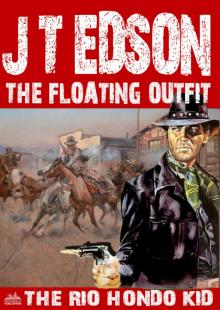 The Floating Outfit 49
The Floating Outfit 49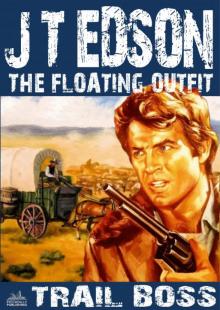 The Floating Outfit 10
The Floating Outfit 10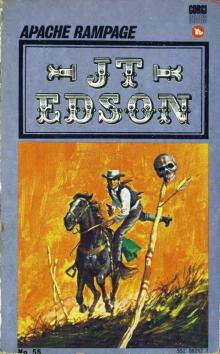 Apache Rampage
Apache Rampage The Floating Outfit 15
The Floating Outfit 15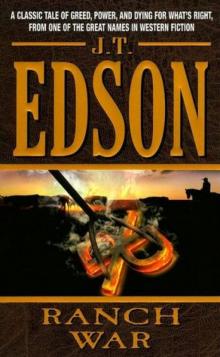 Ranch War
Ranch War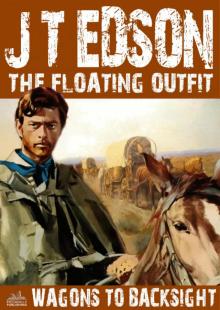 The Floating Outfit 11
The Floating Outfit 11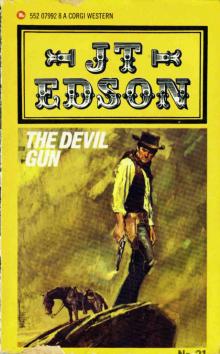 The Devil Gun
The Devil Gun Sacrifice for the Quagga God (A Bunduki Jungle Adventure Book 3)
Sacrifice for the Quagga God (A Bunduki Jungle Adventure Book 3) Comanche (A J.T. Edson Western Book 1)
Comanche (A J.T. Edson Western Book 1)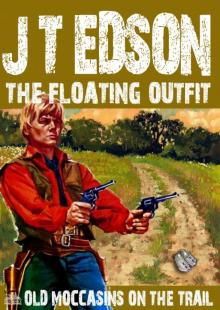 The Floating Outfit 48
The Floating Outfit 48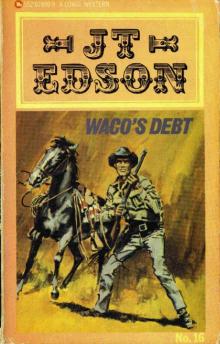 Wacos Debt
Wacos Debt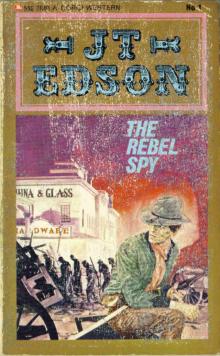 The Rebel Spy
The Rebel Spy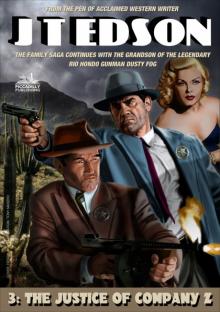 Cap Fog 3
Cap Fog 3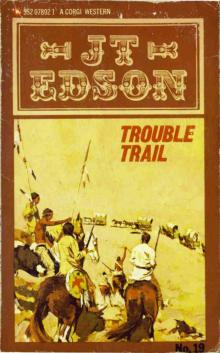 Trouble Trail
Trouble Trail Cold Deck, Hot Lead
Cold Deck, Hot Lead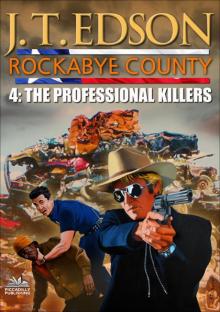 Rockabye County 4
Rockabye County 4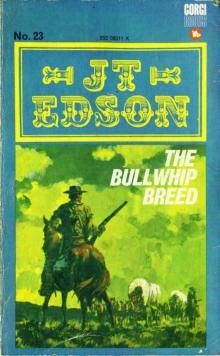 The Bullwhip Breed
The Bullwhip Breed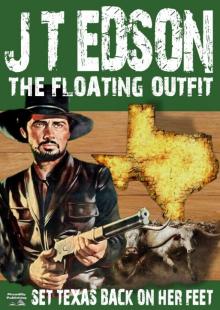 Set Texas Back On Her Feet (A Floating Outfit Western Book 6)
Set Texas Back On Her Feet (A Floating Outfit Western Book 6)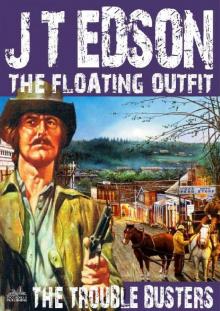 The Floating Outfit 25: The Trouble Busters (A Floating Outfit Western)
The Floating Outfit 25: The Trouble Busters (A Floating Outfit Western) Fearless Master of the Jungle (A Bunduki Jungle Adventure
Fearless Master of the Jungle (A Bunduki Jungle Adventure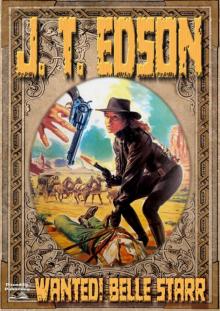 Wanted! Belle Starr!
Wanted! Belle Starr!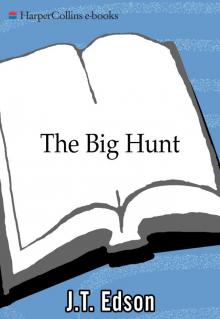 The Big Hunt
The Big Hunt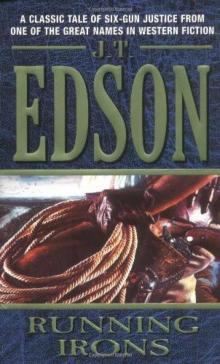 Running Irons
Running Irons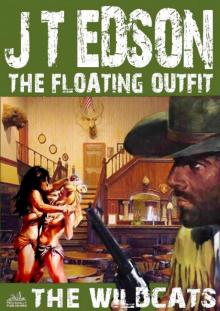 The Floating Outfit 19
The Floating Outfit 19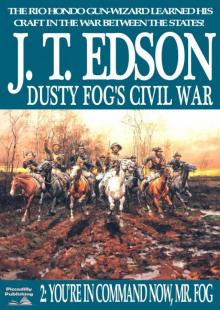 You're in Command Now, Mr Fog
You're in Command Now, Mr Fog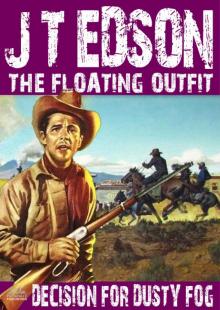 The Floating Outfit 27
The Floating Outfit 27 Texas Killers
Texas Killers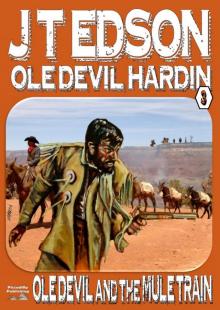 Ole Devil and the Mule Train (An Ole Devil Western Book 3)
Ole Devil and the Mule Train (An Ole Devil Western Book 3) Bunduki and Dawn (A Bunduki Jungle Adventure Book 2)
Bunduki and Dawn (A Bunduki Jungle Adventure Book 2)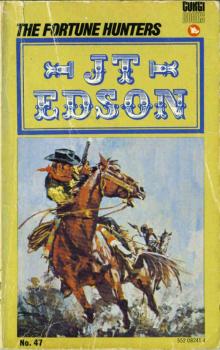 The Fortune Hunters
The Fortune Hunters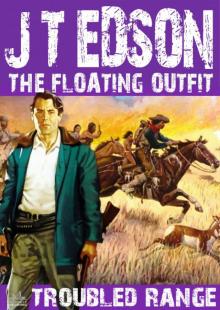 The Floating Outfit 12
The Floating Outfit 12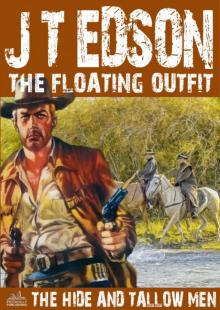 The Hide and Tallow Men (A Floating Outfit Western. Book 7)
The Hide and Tallow Men (A Floating Outfit Western. Book 7)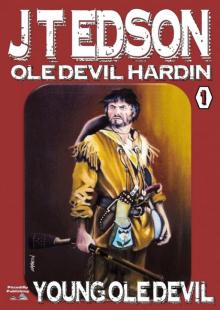 Young Ole Devil
Young Ole Devil Slip Gun
Slip Gun The Drifter
The Drifter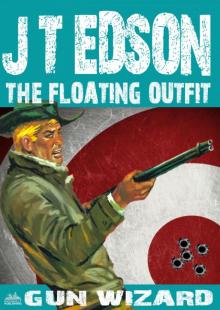 The Floating Outfit 45
The Floating Outfit 45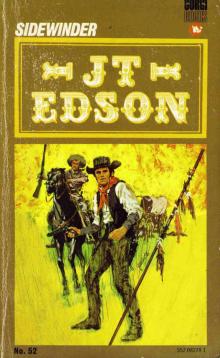 Sidewinder
Sidewinder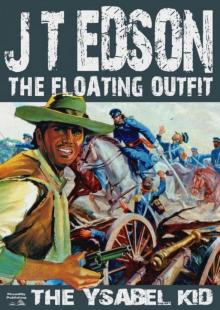 The Ysabel Kid
The Ysabel Kid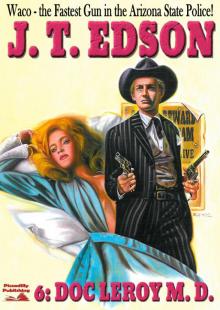 Waco 6
Waco 6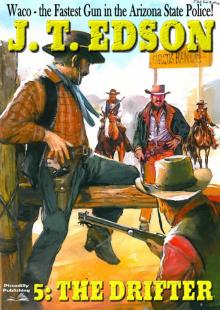 Waco 5
Waco 5 Point of Contact
Point of Contact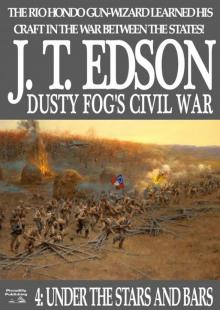 Under the Stars and Bars (A Dusty Fog Civil War Western Book 4)
Under the Stars and Bars (A Dusty Fog Civil War Western Book 4)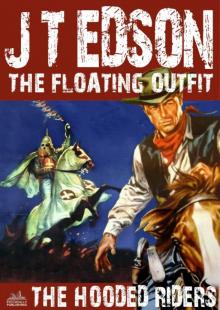 The Floating Outfit 9
The Floating Outfit 9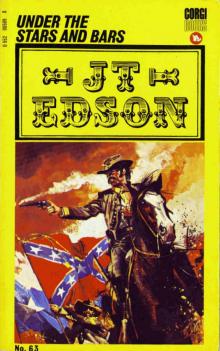 Under the Stars and Bars
Under the Stars and Bars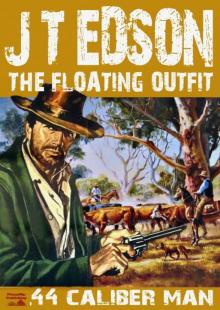 .44 Caliber Man
.44 Caliber Man The Floating Outfit 17
The Floating Outfit 17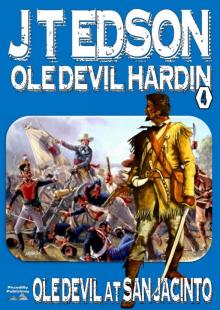 Ole Devil at San Jacinto (Old Devil Hardin Western Book 4)
Ole Devil at San Jacinto (Old Devil Hardin Western Book 4)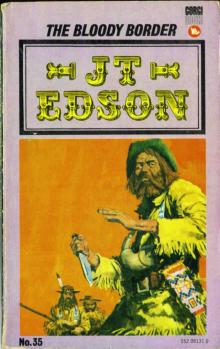 The Bloody Border
The Bloody Border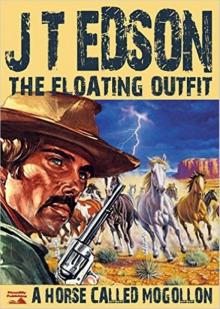 A Horse Called Mogollon (Floating Outfit Book 3)
A Horse Called Mogollon (Floating Outfit Book 3)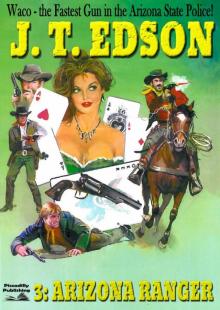 Waco 3
Waco 3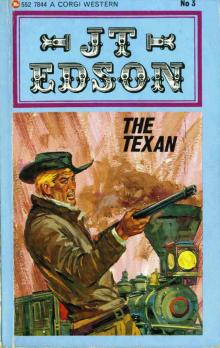 The Texan
The Texan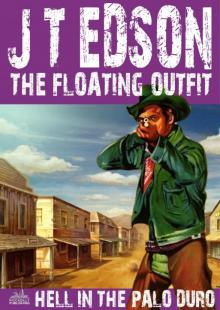 The Floating Outfit 35
The Floating Outfit 35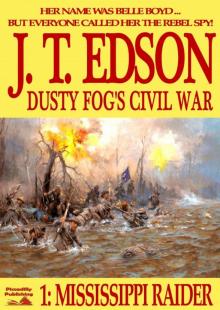 Mississippi Raider
Mississippi Raider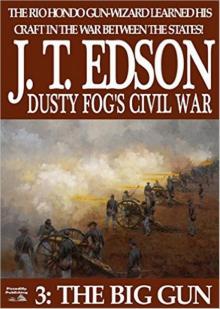 The Big Gun (Dusty Fog's Civil War Book 3)
The Big Gun (Dusty Fog's Civil War Book 3)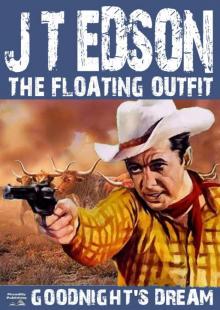 Goodnight's Dream (A Floating Outfit Western Book 4)
Goodnight's Dream (A Floating Outfit Western Book 4) Waco 4
Waco 4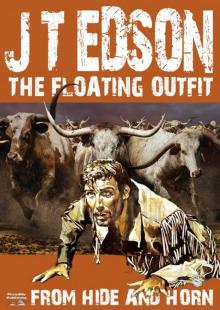 From Hide and Horn (A Floating Outfit Book Number 5)
From Hide and Horn (A Floating Outfit Book Number 5)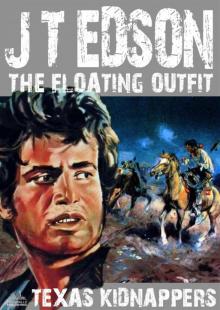 The Floating Outfit 18
The Floating Outfit 18 Slaughter's Way (A J.T. Edson Western)
Slaughter's Way (A J.T. Edson Western)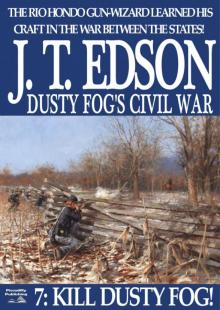 Dusty Fog's Civil War 7
Dusty Fog's Civil War 7 Two Miles to the Border (A J.T. Edson Western)
Two Miles to the Border (A J.T. Edson Western)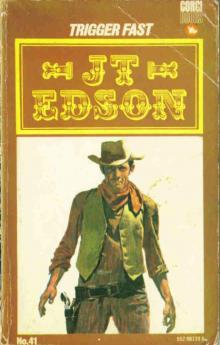 Trigger Fast
Trigger Fast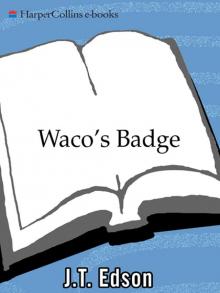 Waco's Badge
Waco's Badge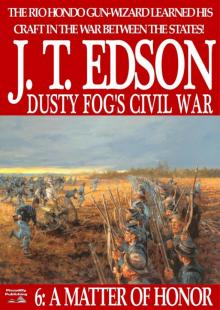 A Matter of Honor (Dusty Fog Civil War Book 6)
A Matter of Honor (Dusty Fog Civil War Book 6)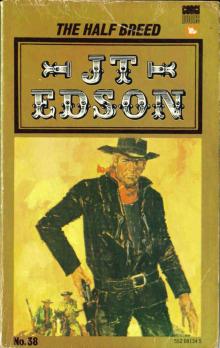 The Half Breed
The Half Breed Bunduki (Bunduki Series Book One)
Bunduki (Bunduki Series Book One)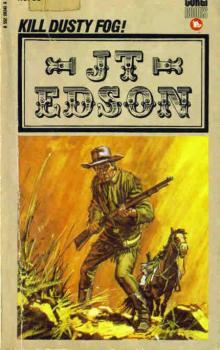 Kill Dusty Fog
Kill Dusty Fog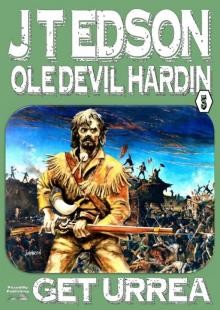 Get Urrea! (An Ole Devil Hardin Western Book 5)
Get Urrea! (An Ole Devil Hardin Western Book 5)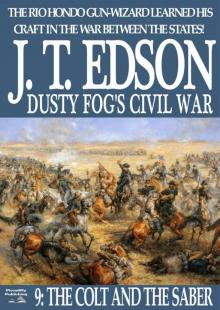 Dusty Fog's Civil War 9
Dusty Fog's Civil War 9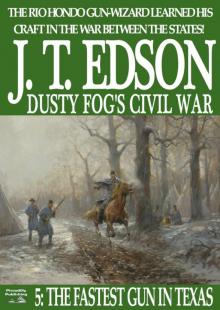 The Fastest Gun in Texas (A Dusty Fog Civil War Book 5)
The Fastest Gun in Texas (A Dusty Fog Civil War Book 5)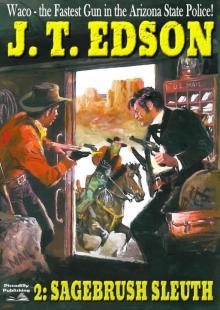 Sagebrush Sleuth (A Waco Western #2)
Sagebrush Sleuth (A Waco Western #2)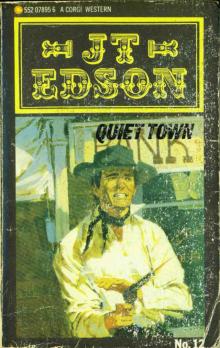 Quiet Town
Quiet Town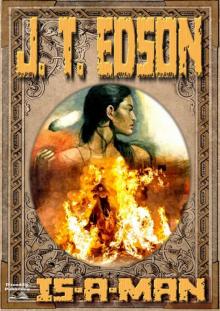 Is-A-Man (A J.T. Edson Standalone Western)
Is-A-Man (A J.T. Edson Standalone Western) Rockabye County 5
Rockabye County 5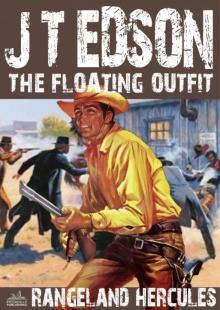 The Floating Outfit 14
The Floating Outfit 14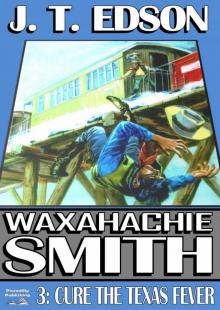 Cure the Texas Fever (A Waxahachie Smith Western--Book 3)
Cure the Texas Fever (A Waxahachie Smith Western--Book 3) The Floating Outfit 13
The Floating Outfit 13 The Road to Ratchet Creek
The Road to Ratchet Creek